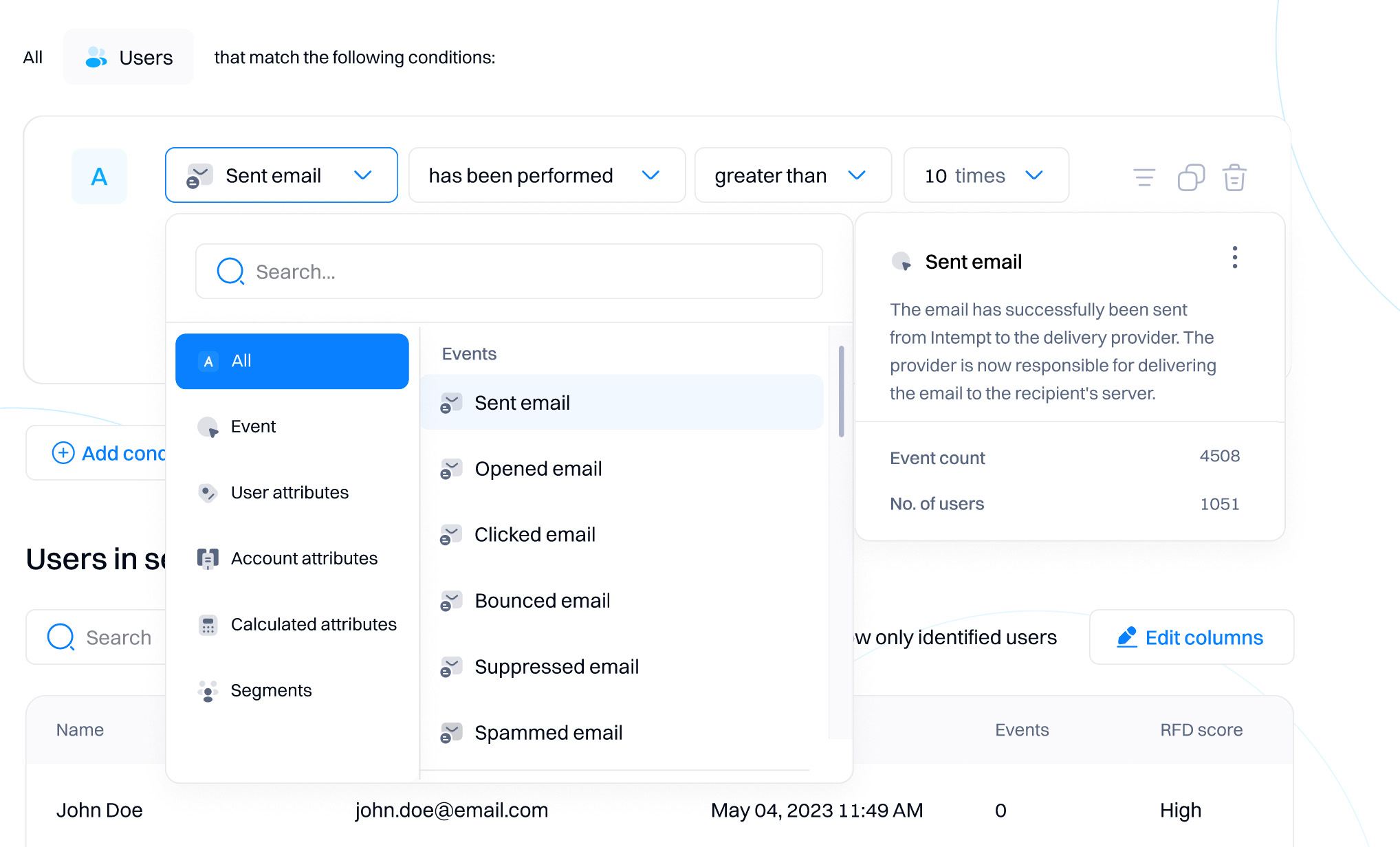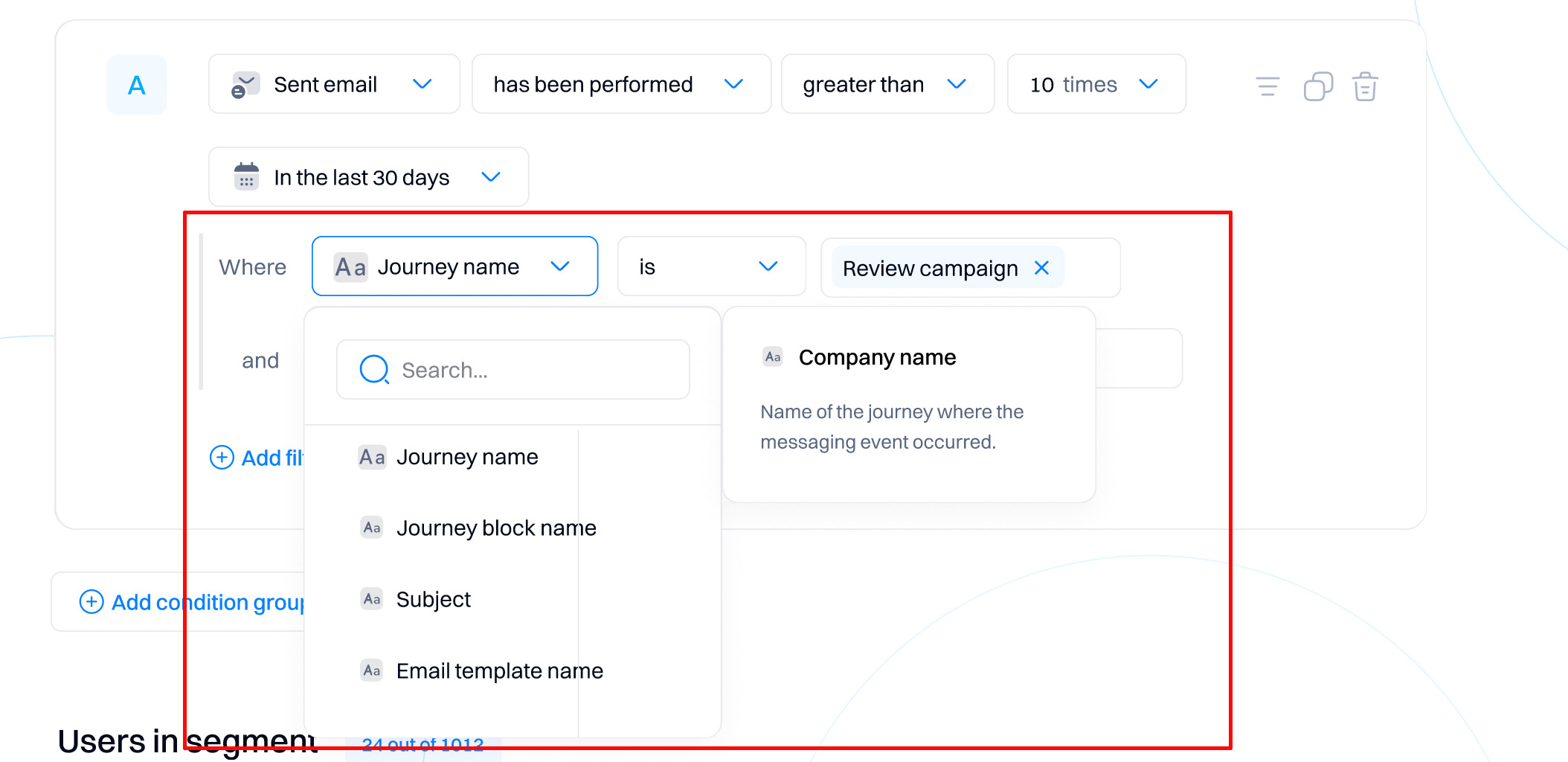Messaging events
Messaging events allow you to track your journey performance across any supported messaging channels. These events are auto-created after you create the project; however, to get actual event data, you must create and launchJourneys with respective messaging blocks.
Messaging event types
There are 4 types of messaging events supported:
- Slack
- SMS
- Webhook
Different message types produce different events. The table below lists the different events of each message type.
| Message type | Sent | Delivered | Opened | Clicked | Bounced | Deferred | Spammed | Unsubscribed |
|---|---|---|---|---|---|---|---|---|
| Email - Sendgrid | ✅ | ✅ | ✅ | ✅ | ✅ | ✅ | ✅ | ✅ |
| Email - Gmail | ✅ | |||||||
| SMS | ✅ | ✅ | ✅ | |||||
| Slack | ✅ | ✅ | ||||||
| Webhook | ✅ | ✅ |
Messaging events
Messaging events will appear in all targeting dropdowns under the event tab.

Email events
-
Sent email. The email has successfully been sent from Intempt to the delivery provider. The provider is now responsible for delivering the email to the recipient's server.
-
Delivered email. Confirmation has been received from the delivery provider that the email was successfully delivered to the recipient’s email service provider.
-
Opened email. The recipient has opened the email. This event is tracked when the email client loads a tracking pixel included in the email or when a link in the email is clicked. We count an email as being opened when the recipient’s email client loads an invisible image (tracking pixel) or when the recipient clicks one of the links in the email.
Good to know
As an increasing number of email clients provide privacy settings that let people block tracking pixels, open metrics may appear misleadingly low. You can disable email open tracking at the workspace level so that you aren’t distracted by potentially unreliable open rates. In general, we recommend focusing on Clicked metrics instead; these metrics reliably measure customer actions based on your messages.
-
Clicked email. The recipient clicked a link within the email. This event tracks specific user engagement with the content provided in the email.
-
Bounced email. The email could not be delivered to the recipient’s email address. Bounces can be hard (permanent issues like an invalid email address) or soft (temporary issues like a full mailbox).
-
Deferred email. The email was not sent, but it hasn’t been completely rejected.
-
Marked as spam email. The recipient marked the email as spam, which affects the deliverability of future emails to this recipient. All subsequent emails for them are marked “suppressed.”
-
Unsubscribed email. The recipient has chosen to unsubscribe from future emails.
SMS events
-
Sent SMS. The SMS message has been successfully sent to Twilio for delivery to the recipient's device.
-
Delivered SMS. Confirmation that the SMS message has been delivered to the recipient's device.
-
Bounced SMS. The SMS message could not be delivered. This could be due to the recipient's phone number being invalid or other deliverability issues.
Slack events
-
Sent Slack message. The message has been sent to Slack and awaits delivery to the specified channel or user.
-
Clicked Slack message. This tracks interactions such as URL clicks within the Slack message, indicating engagement with the content.
Webhook events
-
Sent webhook. The webhook has been triggered and the payload has been sent to the specified endpoint.
-
Clicked webhook. Tracks when actions are taken as a result of the webhook, such as clicking a link in a message generated by the webhook.
Filtering messaging events
You can filter the messaging events based on specific event attributes. Select the messaging event first, then use the in-line filter to narrow down the condition.

Attributes available for filtering messaging events
| Attribute | Explanation | SMS | Slack | Webhook | |
|---|---|---|---|---|---|
| Journey name | Name of the journey where the messaging event occurred. | ✅ | ✅ | ✅ | ✅ |
| Journey block name | Name of the specific block within the journey. | ✅ | ✅ | ✅ | ✅ |
| Subject | Subject line of the email sent. | ✅ | |||
| Email template name | Name of the email template used. | ✅ | |||
| SMS template name | Name of the SMS template used. | ✅ |
Updated 7 months ago